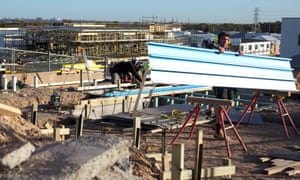Extract from The Guardian
Exclusive: McKell Institute details savings for federal and state governments from moving people out of crisis accommodation
Labor’s $6.6bn housing affordability policy would save federal and
state governments up to $10.8bn, according to a report by the McKell
Institute.
The progressive thinktank cites new modelling by PwC that moving a person from crisis accommodation will save $11,935 per year from reduced use of government services including health services, welfare, police and prisons.
Beyond Coalition attacks on Labor’s negative gearing policy, there has been little discussion of housing affordability in the election campaign, despite the homelessness sector calling for half a million new affordable homes.
In December Labor committed to spend $102m over four years
to incentivise construction of 20,000 affordable homes in its first
term, rising to a cost of $6.6bn for a total of 250,000 homes over a
decade.The progressive thinktank cites new modelling by PwC that moving a person from crisis accommodation will save $11,935 per year from reduced use of government services including health services, welfare, police and prisons.
Beyond Coalition attacks on Labor’s negative gearing policy, there has been little discussion of housing affordability in the election campaign, despite the homelessness sector calling for half a million new affordable homes.
The policy offers 15-year subsidies of $8,500 a year to investors who build new houses, with the taxpayer support conditional on the dwellings being rented to eligible tenants at 20% below market rent.
PwC found that over 10 years Labor’s policy will save at least $5.4bn if half the people living in new affordable houses come out of crisis accommodation or homelessness, a figure that rises to $10.8bn if all of them are drawn from the highest risk groups.
Anglicare’s 10th annual snapshot of the rental market, released on Monday, found that for a single person on the minimum wage of $719.20 a week, fewer than 3% of listings were affordable.
Rents have started to fall in Sydney and growth has slowed in Melbourne as both markets begin to cool. Recent figures suggested Canberra was Australia’s most expensive city to rent, while median rents in Hobart recently surpassed Melbourne.
The McKell report said that “despite the modest fall in housing prices in Australia’s largest cities, for many Australians, owning their own home remains out of reach, leading to a generation of life-time renters”.
McKell concluded the primary benefit of Labor’s policy would be improved health and employment outcomes, and a greater sense of safety, independence and social connectedness. “However, the economic co-benefit of the investment is sizeable.”
In the 2017 budget the Coalition increased the capital gains tax discount for investment in affordable housing and allowed first-home buyers to use the tax benefits of superannuation to save for a deposit, giving young couples a $12,000-plus tax break to buy their first home.

No comments:
Post a Comment